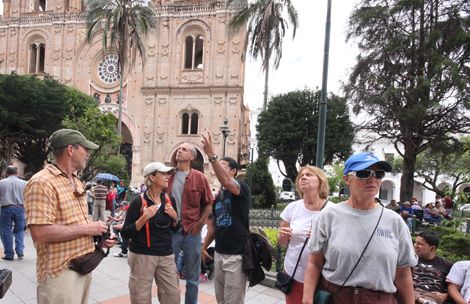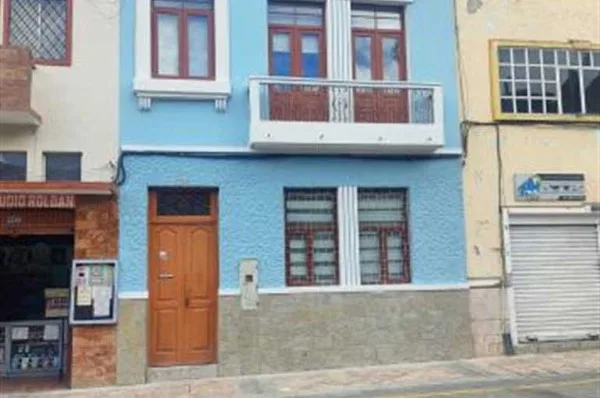Many foreigners lured by the media-hype ‘siren song’ for Cuenca find the cultural adjustments too difficult to make and head for the exit
By Dr. Lee Dubs
You can find a lot of articles that tell you that Ecuador is the perfect place to retire. Plenty of writers encourage you to move to Ecuador, and many want you to make that move for reasons of their own. Some even use words like “thousands” when wanting you to believe how many  English speakers live in particular areas, implying that language and culture will present no problems. Astute readers recognize a sales pitch by those who intend to make a profit from their move. One fact that few writers reveal is that not everyone is happy and that large numbers of English speakers have left and are continuing to leave Ecuador.
English speakers live in particular areas, implying that language and culture will present no problems. Astute readers recognize a sales pitch by those who intend to make a profit from their move. One fact that few writers reveal is that not everyone is happy and that large numbers of English speakers have left and are continuing to leave Ecuador.
Starting in late 2008 and early 2009 international travel readers encountered a plethora of articles extolling the virtues of moving to Ecuador, and North Americans by the hundreds heeded the siren’s call. By 2012, some profit-driven organizations and paid writers were claiming that there were over four thousand expat English speakers living in the city of Cuenca alone. They cited figures from government agencies, not explaining – and sometimes not even knowing – that government figures only show how many temporary and permanent visas, as well as national I.D. cards, were issued over the years, not how many expats are actually living in the country or in any given city. While some Latin countries such as Mexico and Panama do have large English-speaking “colonies,” any purported massive English-speaking communities in Ecuador is a myth. Numbers are much smaller than those extolled by the profit seekers and the ill-informed.
Cuenca alone. They cited figures from government agencies, not explaining – and sometimes not even knowing – that government figures only show how many temporary and permanent visas, as well as national I.D. cards, were issued over the years, not how many expats are actually living in the country or in any given city. While some Latin countries such as Mexico and Panama do have large English-speaking “colonies,” any purported massive English-speaking communities in Ecuador is a myth. Numbers are much smaller than those extolled by the profit seekers and the ill-informed.
It is a fact that there is significant emigration (departure) by North Americans from Ecuador. Although there are no statistics to reveal how many expats have left the country for good, there is a growing belief that the number of English speakers who are leaving Ecuador is growing, while the number arriving had been shrinking by late 2014. One official from the Ecuadorian Ministry of Foreign Relations confirmed to this writer last year that applications by North Americans for resident visas were declining.
One indicator of the drop in immigration into Cuenca by foreigners and also by returning Ecuadorians has been a dramatic slowdown in new construction. Multi-unit buildings sit unfinished and buildings that were scheduled to be constructed are on hold. In some cases, houses were demolished to make way for high-rise buildings, but only rubble sits on the lots.
A second barometer of continuous emigration is the almost daily list of sales on English websites of furniture, appliances, cars, and other goods by those who are leaving the country for good. Expats who have lived in Ecuador a few years or even a few months are saying adiós.
Why are so many Americans and Canadians who came to make Ecuador their home pulling out? What has changed their minds? What are the causes of the accelerating emigration? Reasons vary with individuals, but there are some factors that have been cited frequently by emigrants.
Cost. Many North Americans moved to Ecuador without first making an exploratory trip or doing their homework, choosing to believe often exaggerated figures they had read. Large numbers of immigrants were surprised to find the cost of living higher than they expected, and their budgets were not prepared for reality. Ecuador requires individuals to show proof of a minimum of $800 per month of steady income to acquire a resident visa, a figure that was unrealistically low when it was established in 2003 and which has never been adjusted, even for inflation. Immigrants soon realize that living well requires more than $800 per month. There are different ways to describe how one goes about one’s economic life abroad: living comfortably, subsisting, or surviving. Numerous immigrants have sought methods to create in-country income to supplement their budgets. Most have discovered the complications and expenses of operating a business abroad. Those who operate “under the radar” run the risk of heavy fines and deportation.
Insufficient income is one reason a lot of expats either find a cheaper place to live, go back home with reduced expectations, or stay and maintain a lowered standard of living. It is cheaper to live here than in North America, but it is not as cheap as many were led to believe.
Culture. This is the most common reason for leaving. The pitches that encourage a move to Ecuador focus on cost and are generally scripted to appeal to those with no significant foreign experience. The presentations make it sound as if living in a place such as Ecuador is like a cheap combination of Shangri-La and Utopia rolled into one. To entice foreigners to head to Ecuador, promoters paint warm impressions and often include photographs of beautiful architecture, sandy beaches, and smiling people, where foreigners walk hand in hand with faces aglow. It’s the rose-colored glasses approach. Who doesn’t want a perfect and affordable retirement?
Many people who never even experienced another culture in their own country believe they are ready to live abroad. After their move to Ecuador, they quickly discover that having lived where there were Spanish speakers in one’s own country is not the same as living in their country and experiencing their culture 24/7. Even trying to avoid the locals and immersing yourself exclusively with fellow expats – as some attempt – cannot protect you from the challenges and frustrations of living in a foreign culture day after day after day.
Some expats suffer culture stress from the lack of certain amenities they were used to in their home country. Some emigrants have said that they could not live where there was not a Wal-Mart, for example. Ecuador’s growing list of bans on imported products cuts deep with many expats who can no longer get the “right” brands of mayonnaise, cat food, ketchup, sauces, and a lot of other products. They must buy local brands and often have to adjust to different tastes.
Living in a country whose language is different presents daily frustrations. One writer implied that most Ecuadorians speak English because they almost all study English in school. How are you with the French you studied in high school? Are you ready to chat in French? After all, you studied it. No, most Ecuadorians do not speak English, and foreigners who know little or no Spanish are at a disadvantage and must deal with never-ending frustration.
It is not unusual to encounter expats who cannot or will not accept the changes that face them. They resist their host culture as long as they can, finally realizing they cannot change it and that they will never be happy there. Such realists leave, usually returning to the comforts of their “real home.” Some continue to stay in spite of their growing misery, and anyone within earshot knows how unhappy they are. Fortunately for everyone, most of those finally give up and depart, too.
The daily challenges of living in a foreign culture lead many immigrants to experience culture tension, culture stress, and even culture shock. A remedy for many is simply to get out.
Health. Even with good health care, some immigrants simply get sick and stay sick. Test after test and medication after medication do not provide solutions to their chronic condition. Continuous nausea, diarrhea, weight loss, and other symptoms make for miserable living. Even those who love their new country have to give up and leave.
Homesickness. There are a lot of expats who leave for a fourth reason. They may enjoy life in the new country, but they miss their friends, their children, and their grandchildren too much. Daily contact through email, Skype, and phone calls is not enough. South America, in particular, is too far from “home,” and they finally decide to return in order to be with their loved ones. They thought the distance would not trouble them a lot, but it did.
Note: Homesickness is sometimes the reason given for leaving, when the underlying issue is culture stress. People do not want to return to their native country and hear, “I told you so.”
Crime. In spite of denials by some writers, the types of crime that affect expats are increasing. A representative of one for-profit group answered a question about all the bars and gratings on windows by explaining (presumably with a straight face) that they have nothing to do with crime; they are there to prevent broken windows from all the soccer balls the children kick in the streets. Many expat residents have suffered various degrees of crime, some violent; and it sent them packing. There have been increasing reports of everything from “grab and run” thefts and daylight assaults to home invasions in which people were terrorized, sometimes tied up, and threatened with weapons. Even coming home to find their place ransacked can be the final straw to anyone who is already feeling stressed. Who can blame those who suffer such trauma for leaving?
What is the common denominator to all of the above? Choice. Every North American immigrant in any country chose to move there, in spite of occasional excuses about “having to leave” for economic or political reasons. Every immigrant who arrives voluntarily in someone else’s country chooses to stay or leave. The point of this article is to inform readers that more and more are choosing to leave Ecuador for various reasons. Think before you move.
Living in a foreign country is not for everyone, regardless of how rosy a picture is painted from outside. People who finally admit to themselves that they are not happy in another country choose what to do about their dilemma. Increasing numbers are deciding to leave and to seek happiness elsewhere. Some of us who are happy to live abroad have chosen to write about the realities of life in another country. We want to help people arrive prepared. We do not wear rose-colored glasses.
Credit: Article was originally posted on SouthofZero.com, which Dr. Dubs recommends.


















